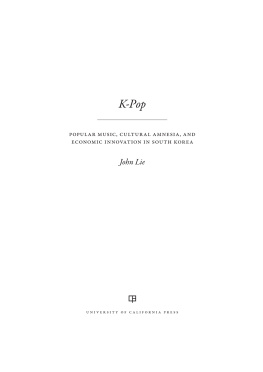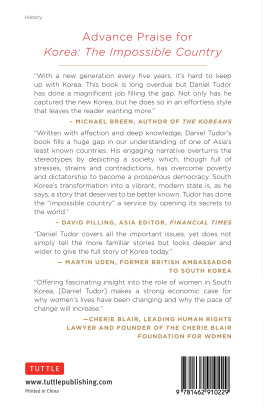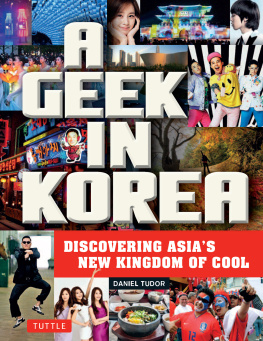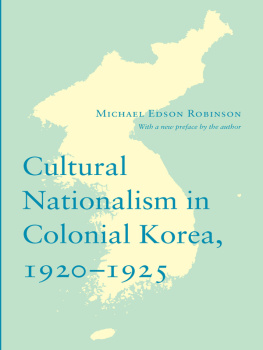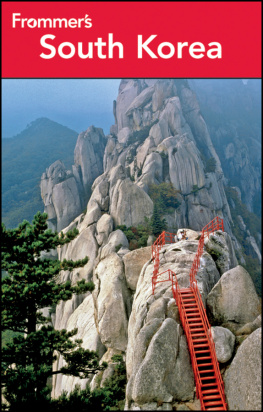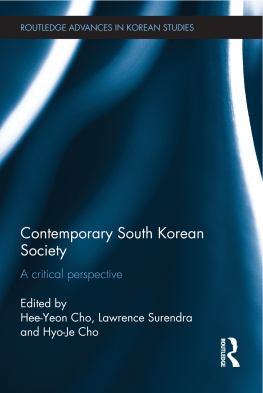PRELUDE
In the spring of 2012, a sabbatical year that I was spending primarily in Paris, I found myself on a long trudge through a windswept Berlin suburb, with pedestrians few and far between and my sense of solitude accentuated by the unusually cold, dark day. I sought respite in a Vietnamese restaurantempty, I saw upon enteringand ordered. As I began to eat, the young waitress continually eyed me, her only customer. After a few minutes, she reapproached my table and started firing questions at me. The point of this battery was to ascertain my national origins.
Reticent though I am, I let out that I am of Korean ancestry, and this revelation appeared to delight her. She erupted in an extended colloquy on her love for South Korean popular culture in general, and for that countrys contemporary popular music known as K-pop, in particular. She told me that her friends gathered regularly to perform contemporary K-pop songs. Then she asked my opinion of how precise and authentic ( echt ) her K-pop dance step was.
Given what was then my own scant exposure to K-pop, all I could do was offer a halfhearted smile of approval for her vigorous routine and then turn back to my no longer solitary repast. But the intraprandial entertainment had also presented much food for thought. At the time, all I could think of was a transposition of Samuel Johnsons sexist jibe: South Korean popular music sung outside South Korea is like a dogs walking on his hinder legs. It is not done well; but you are surprised to find it done at all.
When I returned to Paris, an acquaintance invited me to a K-pop concert, supposedly featuring some of the genres biggest stars. I would have preferred to protect my declining aural faculty, but the fleeting memory of the impromptu performance in Berlin piqued my interest. I was expecting the The MCs intoned their introductions, as did the K-pop stars their greetings, in Korean, a language that surely very few in the audience understood. But these young Europeans didnt seem to mind. They were every bit as ecstatic as the audiences I recalled from my time at rock and punk concerts in Boston and elsewhere during the century just past. As earworm-inducing refrains, catchy melodic lines, and propulsive rhythms adjoined precise choreography, professional sheen, attractive stars, and trendy costumes, the parade of K-pop acts was interrupted by fans who bestrode the stage to cover their favorite song-and-dance routines, lip-synching and swinging their hips to the delight of everyone present. On the metro ride home, dazed and confused, I dodged drunks and sought to make sense of the spectacle.
A few days later I went to Tokyo and was greeted by billboards announcing a new album by the South Korean group Girls Generation (Sony Sidae in Korean; Shjo Jidai in Japanese). I walked by a small shop and looked inside to see the middle-aged proprietor swaying her behind to a TV broadcast of the hip dance propagated by the South Korean pop group KARA. I also discovered that three South Korean groups had participated in the previous years Khaku Utagassen (the annual red-white singing contest, broadcast on New Years Eve), a telecast that continues to capture a large audience and features many of the most popular singers in Japan.
From Tokyo I caught a flight to South Korea, where I was scheduled to deliver several lectures. My companions on the flight were a throng of middle-aged Japanese women whose topics of conversation included not just their planned shopping spree in Seoul, and their upcoming pilgrimage to iconic sites of South Korean television dramas, but also K-pop. I gave my lectures in Seoul, and by now I was no longer surprised by the large number of non-Korean students, not just from neighboring Asian countries but also from Europe and Latin America, who expressed enthusiasm for South Korean popular music.
I saw that K-pop had become a global phenomenon. But a scan of the media, print as well as social, soon revealed that my discovery was far from exclusive. Jon Caramanica, writing in the New York Times after attending a K-pop concert at Madison Square Garden, said that any American reality-TV talent show or major-label A&R department worth its salt would be
Meanwhile, in South Korea itself, governmental bureaucrats and serious scholars, spurred by external enchantment with the countrys popular culture, expressed their appreciation by showering financial support and academic attention on the nations newfangled soft power. The conservative Lee Myung-bak regime, without desisting from its orgy of censorship, couldnt muster enough encomia when it came to K-pop. President Lee addressed the nation by radio after a trip to Turkey, gushing that K-pop was loved by young Turkish people and citing such South Korean stars as the K-pop group JYJ as a major asset to the future of [South] Korean culture.
All bluster and hyperbole aside, descriptions and explanations of K-pop do tend to rely disproportionately on the ready-made vocabulary of Korean tradition, Confucian culture, and other mythemes of contemporary South Korea. And I dont think thats rightwhich is the point of this book.
But caveat lector: the book is not a glorified fanzine for readers who would like to know more about their favorite K-pop stars and songs; the imprimatur of a university press should be enough to dispel such a notion. I have also eschewed extended analyses of lyrics: the words of popular songs do function at times as something of a poetry of everyday life, but it would be misleading to regard them as the main attraction of popular music. Although I touch on various topics and disciplinesincluding sartorial, corporeal, and televisual presentationsmy main intention is to raise and answer three questions (addressed in chapter 1, the interlude, and chapter 2, respectively).

